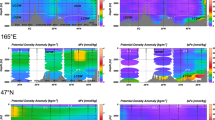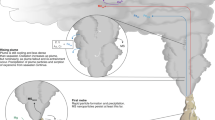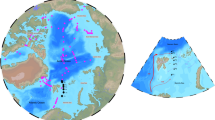Abstract
The marine geochemistry of tellurium is unknown, being one of the few elements whose concentrations in seawater have never been reported1,2. The major problem in studying Te stems from its rarity and the poor sensitivities of most analytical methods (even its crustal abundance is still controversial3). We have developed a very sensitive method allowing accurate measurements to be made of Te(IV), Te(VI) and total Te in seawater and we present here several vertical profiles of these species, which were obtained from the ocean. The Te profiles resemble in part the behaviour of Se and in part that of Po, reflecting the position of Te between Se and Po in Group VIb of the Periodic Table. Te, like Se, is found to be present in two oxidation states, Te(VI) and Te(IV), but their relative stabilities are reversed with respect to Se4–7. Se(VI), which is thermodynamically stable, and the unstable Se(IV) both exhibit nutrient-type distributions, but the distribution of Te, like 210Po8, shows evidence of strong scavenging by marine participates, consistent with the chemical speciation of Te(VI) as a hydrosilate (Te(OH)6), similar to Po(IV)OH4), rather than as an oxyanion, like Se(VI)O2−4.
This is a preview of subscription content, access via your institution
Access options
Subscribe to this journal
Receive 51 print issues and online access
$199.00 per year
only $3.90 per issue
Buy this article
- Purchase on Springer Link
- Instant access to full article PDF
Prices may be subject to local taxes which are calculated during checkout
Similar content being viewed by others
References
Quinby-Hunt, M. S. & Turekian, K. K. EOS 64, 130–131 (1983).
Bruland, K. W. Chemical Oceanography Vol. 8 (eds Riley, J. P. & Chester, R.) 157–220 (Academic, London, 1983).
Zemann, J. & Leutwein, F. Handbook of Geochemistry, Vol. 3 (ed. Wedepohl, K. H.) 52-E-1 (Springer, Berlin, 1974).
Measures, C. I. & Burton, J. D. Earth planet. Sci. Lett. 46, 385–396 (1980).
Measures, C. I., McDuff, R. E. & Edmond, J. M. Earth planet. Sci. Lett. 49, 102–108 (1980).
Measures, C. I., Grant, B. C., Mangum, B. J. & Edmond, J. M. Trace Metal in Seawater (eds Wong, C. S. et al.) 73–83 (Plenum, New York, 1983).
Measures, C. I., Grant, B. C., Khadem, M., Lee, D. S. & Edmond, J. M. Earth planet. Sci. Lett. 71, 1–12 (1984).
Bacon, M. P., Spencer, D. W. & Brewer, P. G. Natural Radiation Environment III Vol. 1 (eds Gesell, T. F. & Lowder, W. F.) 473–501 (USDOE Energy Rep. WNF-780422, US Government Printing Office, Washington DC, 1978).
Lee, D. S. Analyt. Chem. 54, 1682–1686 (1982).
Measures, C. I. & Edmond, J. M. Earth planet. Sci. Lett. 66, 101–110 (1983).
Schaule, B. K. & Patterson, C. C. Trace Metals in Seawater (eds Wong, C. S., et al.) 487–504 (Plenum, New York, 1983).
Turner, D. R., Whitfield, M. & Dickson, A. G. Geochim. cosmochim. Acta 45, 855–881 (1981).
Author information
Authors and Affiliations
Rights and permissions
About this article
Cite this article
Lee, D., Edmond, J. Tellurium species in seawater. Nature 313, 782–785 (1985). https://doi.org/10.1038/313782a0
Received:
Accepted:
Issue Date:
DOI: https://doi.org/10.1038/313782a0
This article is cited by
-
Occurrence and distribution of dissolved tellurium in Changjiang River estuary
Chinese Journal of Oceanology and Limnology (2014)
-
Meerwasser-Chemismus
Naturwissenschaften (1989)
-
Th and Pa isotopes in the waters of the western margin of the pacific near Japan: Evidence for release of228Ra and227Ac from slope sediments
Journal of the Oceanographical Society of Japan (1987)
Comments
By submitting a comment you agree to abide by our Terms and Community Guidelines. If you find something abusive or that does not comply with our terms or guidelines please flag it as inappropriate.



